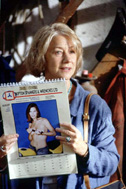
Movie Guru Rating:

Comment
on this review
| |

Calendar Girls exposes ample charms
by Scott McNutt
Britain has developed something of a cottage industry in producing cheery films about ordinary people taking initiative to improve their lives, and perhaps others' lives as well, in some wee—but meaningful—way. Cinema-goers have thrilled to the exploits of eccentric British villagers in such projects as The Englishman Who Went Up a Hill and Came Down a Mountain, Waking Ned Divine, Brassed Off, and The Full Monty. OK, "thrilled" might be too forceful a verb in this context. "Charmed" is more apt; cinema-goers have been charmed by those movies, just as they are being charmed by Calendar Girls.
Calendar Girls is by no means a perfect movie. For a simple story of the smaller matters in human life and death, its production is sometimes awkwardly slick. It is, at turns, overly dramatic, when quieter pathos would have served the story better. And it has its share of cliché moments. But some of its predictability stems from the nature of the tale it tells, and its fondness for its characters is understandable. Plus, the actors' performances are uniformly winning.
Calendar Girls is based on the true story of brassy Chris Harper (Helen Mirren) and sweet Annie Clark (Julie Walters), two middle-age friends who convince 10 other members of a North Yorkshire village's Women's Institute to join them in posing nude for a calendar. The members of the local chapter of the W.I. mostly spend Thursday evenings hearing gnomish old fogies prattle on about the founding of the British Milk Board and the history of broccoli. Their annual charity calendars regularly feature flower arrangements and local landmarks. So why would these respectable ladies even consider such a proposal? Because proceeds from the calendar sales will go to buy a replacement for an uncomfortable sofa at the local cancer ward, where Chris and Annie recently spent much time while Annie's beloved husband John (John Alderton) was dying of leukemia.
Before his leukemia was discovered, John had grudgingly agreed to be a speaker at one of the weekly W.I. meetings (after much badgering from Chris and Annie). In a touching scene set just before his death, John shares with Annie the speech he had prepared, telling her that, like flowers, the women of their village, named Knapely, grow more glorious and beautiful with age. When Chris learns of the speech, she takes it as an inspiration. The calendar will pay homage to John's sentiment, featuring the Knapely women and John's favorite flower, the sunflower, in their full glory.
The movie follows Chris and Annie's trials, tribulations, and astonishing triumphs as they hector their friends to join the project, seek approval for it from both their stuffy local chapter president and the president of the national W.I., arrange the photo shoot itself, and cope with its aftermath.
Although any plot depends on conflict to move the story along, both the greatest weakness and greatest strength of Calendar Girls is that, really, the obstacles Chris and Annie face in the course of producing the calendar are not insurmountable. This is a straightforward comedy of two friends trying to do a little good in a world that can be monstrously indifferent to suffering.
So when the movie keeps these dilemmas personal and small, as when Chris and Annie cajole an unnerved male photographer and wrangle the equally apprehensive coterie of nude middle-aged matrons into the photo shoot, Girls explores the human condition with heart and humor. (Chris's shout "We need bigger buns!" in reference to some pastry props intended to obscure the, ah, womanly attributes of the first subject, had the theater roaring.) When the movie tries for a Big Statement, it doesn't succeed so well. Jaded viewers may yawn over moments such as Chris's shove-your-snotty-attitudes speech to the entire national body of the Women's Institute or the Knapely ladies' Hollywood excursion after the calendar becomes an international bestseller. But overall, the movie depends less on artifice and far more on its good heart and its even better cast to win audiences. And win they do.
The character shadings Mirren gives to the slightly ambitious, subtly manipulative Chris wouldn't work if Girls were any fluffier. Fortunately, Walters plays Annie as the less-complicated, well-grounded soul of the duo, and a marvelous balance is struck between the two. Ciar�n Hinds, as Chris's supportive husband Rod, isn't given much to do, but he invests the character with such gravity that one wishes more time could have been spent on interaction between centered Rod and flighty Chris.
The rest of the ensemble know their role is to support the performances of the two main stars and provide context for Annie and Chris's story. Linda Bassett, Celia Imrie, Annette Crosbie, and Penelope Wilton do just that, without sacrificing the individuality of their characters (although the subplot involving Wilton's philandering husband is another of those elements that seem a tad contrived). And every nervous tic of Philip Glenister as the very flappable photographer, Lawrence, is worth watching.
Despite its subject matter, Calendar Girls is more droll than racy; nonetheless belly laughs abound from our reflexive discomfiture with nakedness.

January 29, 2003 * Vol. 14, No. 5
© 2000 Metro Pulse
|





